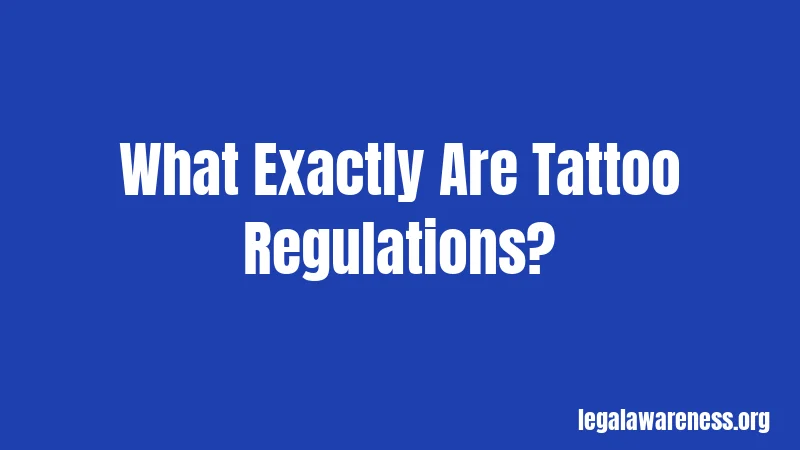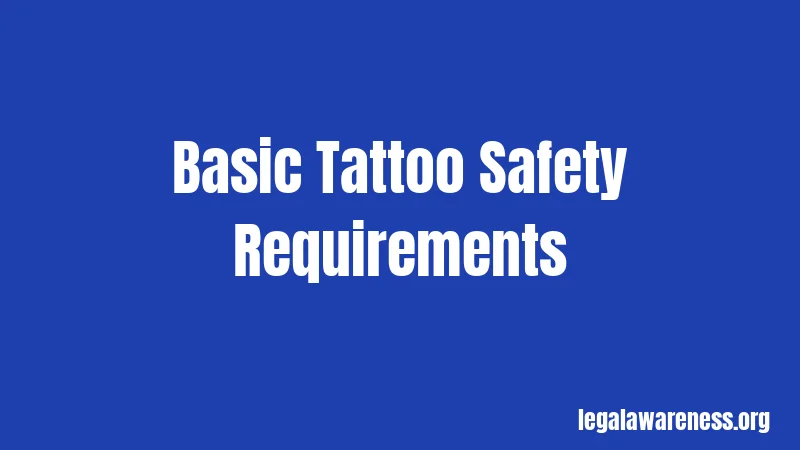Missouri Tattoo Laws (2026): The Complete Beginner’s Guide
Most people don’t realize how regulated the tattoo industry actually is. Seriously. If you’re thinking about getting a tattoo in Missouri, there are specific rules you need to know about. The good news? They’re not complicated once you break them down.
Whether you’re a first-time tattoo customer or someone curious about the laws, this guide covers everything. We’ll walk through age requirements, health and safety standards, what tattoo artists must do legally, and what happens if someone breaks the rules. By the end, you’ll understand exactly what’s legal in Missouri.
What Exactly Are Tattoo Regulations?

Think of tattoo laws like health codes for restaurants. They exist to protect you. They make sure tattoo artists follow safety standards. They require proper training and sanitation. Honestly, these rules exist because tattoos involve breaking your skin, which carries real health risks if done wrong.
In Missouri, the state doesn’t have super strict overall tattoo licensing laws compared to some states. But cities and counties can make their own rules. So what’s legal in one city might be different in another. That’s why knowing your local rules matters.
Age Requirements: The Main Rule
Here’s where it gets straightforward. You must be at least 18 years old to get a tattoo in Missouri. Period. No exceptions for parental consent. No exceptions for health reasons. You need to be a legal adult.
If you’re 17 and thinking about getting a tattoo anyway, don’t. A tattoo artist who tattoos you could face serious consequences. It’s not worth the risk for them, and it’s not worth the legal trouble for you either.
What if you’re under 18 and really want a tattoo? Wait. Seriously. I know it sounds annoying, but in less than a year, you can legally get one without breaking any laws.
Basic Tattoo Safety Requirements

Here’s what most people don’t know: Missouri requires tattoo equipment to meet certain standards. Your tattoo artist should be using sterile needles. Every single time. The equipment should be properly sterilized in an autoclave, which is basically a medical-grade sterilizer.
Sound complicated? It’s actually pretty straightforward. Any reputable tattoo shop does this automatically. If a shop won’t show you their sterilization process or seems vague about it, walk out. This isn’t something to compromise on.
Blood-borne pathogen training is required in most places where tattoos happen. Your artist should know how to prevent infections and handle potential health risks. Many tattoo artists also get certified in bloodborne pathogen training voluntarily, even if their local area doesn’t require it. This shows they take safety seriously.
Informed Consent: What This Means
Before you sit down in that chair, you’ll sign papers. These aren’t just legal protection for the shop. They protect you too. The shop needs to make sure you understand what’s about to happen.
You should get clear information about the risks. Infections are possible. Allergic reactions to ink can happen. Scarring might occur. Permanent marks on your body are exactly that: permanent. Once it’s done, removing it is expensive and painful.
The artist should also ask about your health history. If you’re on blood thinners or have certain skin conditions, you need to mention this. Your doctor might even recommend you wait or avoid tattoos altogether. That’s between you and your medical provider.
Hepatitis and Disease Prevention

Okay, pause. Read this carefully. One of the biggest reasons tattoo regulations exist is disease prevention. You need to know about this.
Hepatitis B and C can spread through non-sterile needles. HIV can spread the same way. These are serious, permanent conditions. That’s why sterilization isn’t optional. It’s essential.
Missouri requires tattoo facilities to follow bloodborne pathogen standards. Your artist should wear gloves. They should use new, sterile needles for every single client. The workspace should be clean and disinfected between customers. This protects both you and the artist.
If you notice a shop cutting corners on cleanliness, report it. You’re not being annoying. You’re protecting other people.
Licensing and Registration Requirements
Here’s where Missouri gets interesting. The state doesn’t require statewide tattoo artist licensing like some states do. This sounds scary, but read on. Many cities have their own regulations.
Kansas City and St. Louis have specific tattoo regulations within their city limits. Other cities are developing rules too. Your city might require tattoo artists to register with the health department or get a local license. Some areas require specific training or certifications.
Not sure what your city requires? Call your local health department. They’ll tell you exactly what rules apply where you live. It takes five minutes and could save you from getting work done by someone operating illegally.
Health Department Inspections and Standards
In cities with regulations, the health department inspects tattoo shops. These inspections check for cleanliness, proper sterilization, and safe practices. Think of it like food service inspections but for tattoo shops.
What are inspectors looking for? Proper storage of needles and ink. Documentation that equipment is sterilized correctly. Clean workspaces. Proper disposal of biological waste. Basic stuff that keeps you safe.
Many reputable shops welcome inspections. They have nothing to hide. If a shop seems nervous about health department visits or won’t let you ask about inspections, that’s a red flag. You deserve to know your artist operates safely.
What About Aftercare Requirements?
Your artist’s job doesn’t end when they finish your tattoo. They should give you detailed written aftercare instructions. Not just verbal. Written instructions you can reference.
Proper aftercare prevents infections. Your artist should explain how to clean the tattoo, what products to use, and when to seek medical help. They should tell you to avoid pools, hot tubs, and soaking for a specific period. They should warn you about signs of infection.
You’re not alone if you have aftercare questions. Most people need clarification. Don’t feel embarrassed calling the shop back. Good artists expect this.
Placement Restrictions and Special Rules
Missouri doesn’t ban tattoos on specific body parts for adults. You can get tattooed on your face, hands, neck, or anywhere else legally. This is different from some states with stricter rules.
However, some employers and social situations might have issues with visible tattoos. That’s a personal and professional choice, not a legal restriction. Before you get a neck or face tattoo, think about your career and long-term plans. Tattoo removal is possible but expensive and painful.
For certain government jobs, visible tattoos might have limits. Military service has specific tattoo policies too. If you work in a professional field, check your employee handbook first. Most jobs just require tattoos be covered during work hours.
Tattoo Removal and Regret
Not sure about a design? Smart thinking. Getting a tattoo is permanent. Removal exists but isn’t like erasing a pencil mark.
Laser removal typically takes multiple sessions. It’s expensive, costing hundreds to thousands of dollars. It can hurt. It can cause scarring. Some colors are harder to remove than others. Black ink is easiest. Bright colors are harder.
Before you get tattooed, imagine that design on your body forever. Talk to your artist about designs you’ve seen and loved for years. Avoid trends that might feel dated in five years. Most professional artists will talk you through design longevity.
Getting Tattooed While Pregnant
Wondering if this applies to you? Here’s what you should know. There’s no Missouri state law preventing pregnant people from getting tattoos. But most responsible artists won’t tattoo you while pregnant anyway.
Here’s why: The risk of infection is higher during pregnancy. Your immune system changes. Blood loss concerns exist if something goes wrong. Plus, lying on your stomach might be uncomfortable later in pregnancy.
If you’re pregnant and want a tattoo, talk to your OB-GYN first. Then talk to your artist. Most will suggest waiting until after you’ve given birth and aren’t breastfeeding. This is a safety choice, not a legal one.
Minors and Temporary Tattoos
Let’s be clear on something. Getting someone under 18 tattooed is illegal in Missouri. An artist who does this can face criminal charges. You could face legal consequences too if you help arrange it.
But what about temporary tattoos and henna? Temporary tattoos are completely legal for any age. They wash off in a few weeks anyway. Henna is also legal. Some people use henna as a trial run before committing to a permanent tattoo. That’s actually smart.
Penalties for Breaking Tattoo Laws
So what happens if someone breaks these rules? The consequences depend on what rule was broken.
An artist who tattoos a minor could face battery charges or assault charges. That’s serious. Criminal charges go on their permanent record. Their career could end. Fines are usually involved too.
If a shop operates without required licensing or registration, they face fines. In some cities, they face closure. The business owner might face criminal charges depending on how serious the violations are.
If you get tattooed at an unregistered shop as an adult, you’re not usually in legal trouble. But you’re at higher risk for infection and poor quality work. You might have no recourse if something goes wrong.
How to Find a Legal, Safe Tattoo Artist
Here’s where it gets practical. How do you actually find someone operating legally? Start with reputation. Check online reviews. Look at the artist’s portfolio of work.
Call ahead and ask questions. Where did they train? How do they sterilize equipment? Can they show you their safety protocols? Good artists are happy to answer. They know this matters.
Ask about any local licensing or registration. If your city requires it, the shop should have documentation. You can also call your health department and ask if a specific shop is registered and in good standing.
Visit the shop before you commit. Is it clean? Do you feel comfortable there? Does the artist listen to your ideas or push their own vision? Trust your gut. If something feels off, find someone else.
Getting Tattooed Out of State
Planning a road trip and thinking about getting a tattoo elsewhere? That’s fine legally. Whatever state you get tattooed in, their laws apply to that session. But once you’re back in Missouri, Missouri laws apply to any follow-up work.
Some people travel for specific artists. That’s totally normal. Just make sure the out-of-state artist operates legally where they are. The same safety standards should apply everywhere.
Religious and Cultural Considerations
Some religions have specific teachings about tattoos. Some cultures have traditional tattoo practices. Missouri law doesn’t restrict tattoos based on religion or culture.
If you’re getting a culturally significant tattoo, find an artist who respects that tradition. Some artists specialize in specific cultural designs. Indigenous tattoo artists, for example, might have specific practices for traditional designs. Working with someone who understands the cultural significance matters.
Frequently Asked Questions
Can I get a tattoo at 17 with parental consent? No. Missouri law requires you to be 18 regardless of parental permission. There’s no exception for any reason.
What should I look for in a tattoo artist? Check their portfolio, read reviews, verify local licensing, ask about sterilization practices, and trust your gut feeling about their professionalism.
How do I know if a shop is safe? Visit the shop, observe cleanliness, ask about sterilization procedures, and call your health department to verify licensing if required in your area.
Can I get a tattoo on my face? Yes, there’s no law against facial tattoos in Missouri for adults. But consider how it might affect your career before committing.
What if I get an infection from a tattoo? See a doctor immediately. Describe where and when you got the tattoo. Save any documentation from the shop. You might have legal recourse against the artist or shop.
Can tattoo artists refuse clients? Yes. An artist can refuse service for any reason, including if they have concerns about your safety or the design you want.
Is there an age limit for tattoo removal? No legal age limit exists for removal. But cost, pain, and multiple sessions are real concerns to discuss with a dermatologist.
What’s the difference between a licensed artist and an unlicensed one? Licensed artists have met local training and safety requirements. Unlicensed artists might not have the same safety standards. Always verify if your city requires licensing.
Final Thoughts
Now you know the basics of Missouri tattoo laws. The main thing to remember is this: You must be 18. Your artist should prioritize safety and sterilization. And your local city rules matter too.
Getting a tattoo is a big decision. Take your time choosing a design and finding the right artist. Check out their work. Ask questions. Make sure you’re comfortable with safety protocols. Trust your instincts.
When in doubt, call your local health department. Ask questions before you sit in that chair. A good artist expects this and welcomes it. Stay informed, stay safe, and enjoy your tattoo experience.
References
Missouri Department of Health and Senior Services
City of Kansas City Health Department
St. Louis City Department of Health
Bloodborne Pathogens Standard – OSHA
National Tattoo Association – Safety Guidelines
